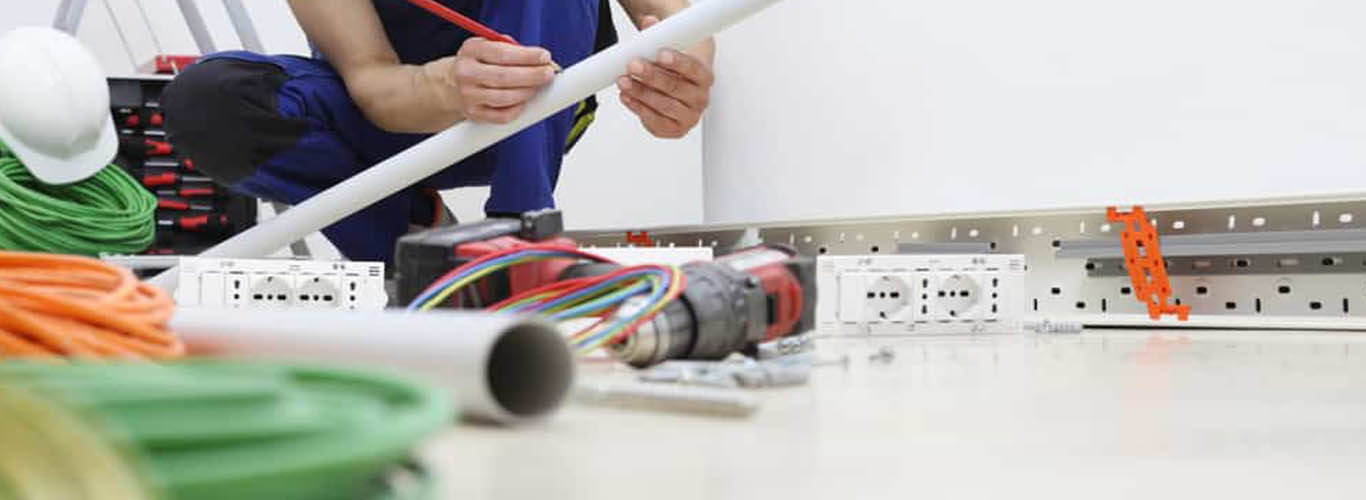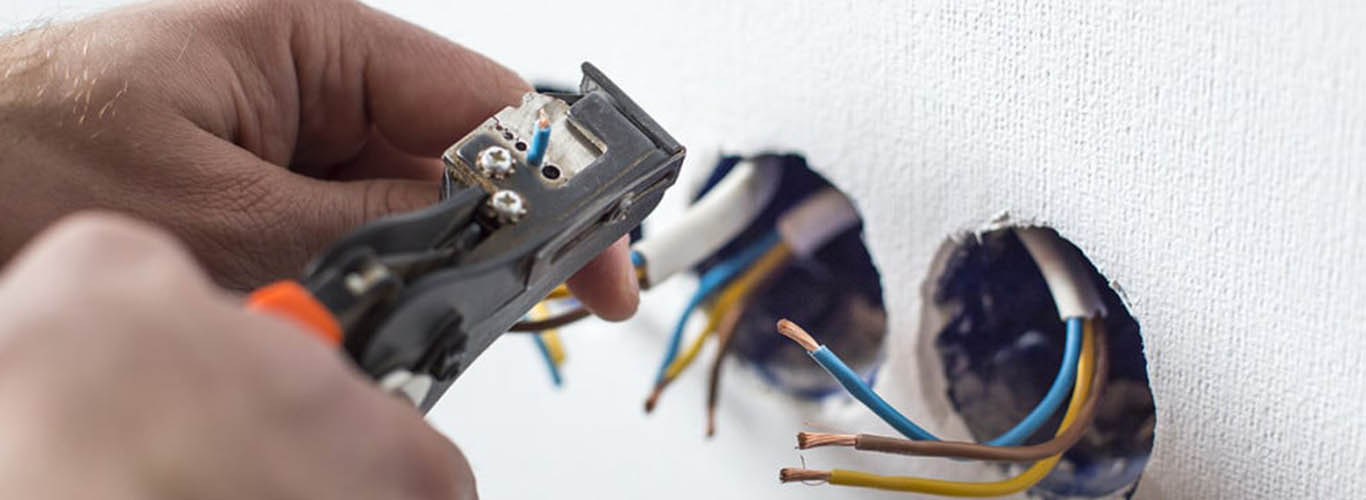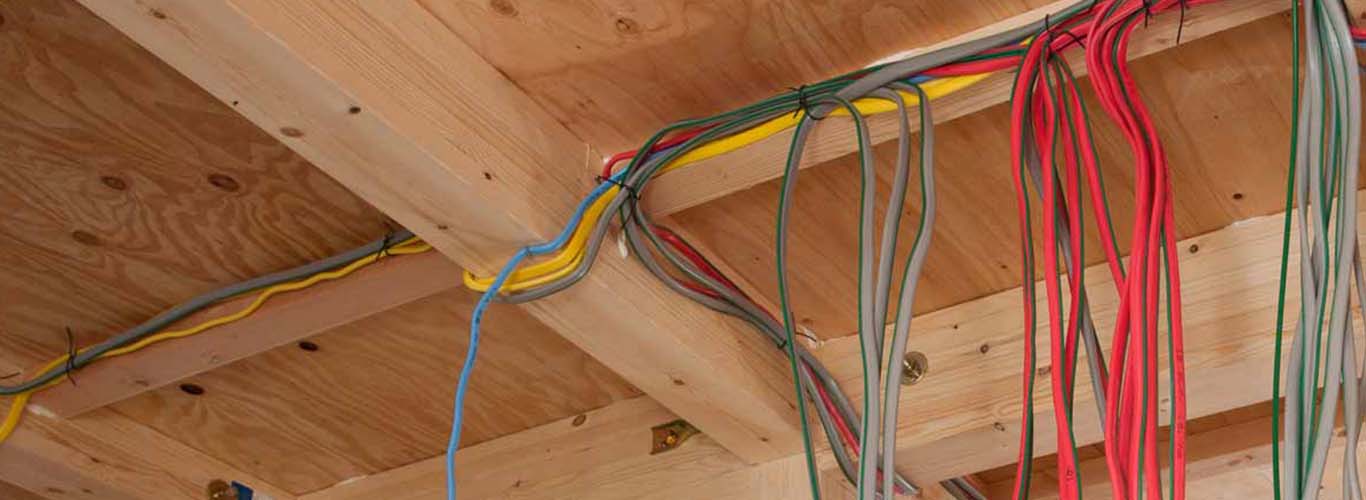Emergency Electricians Plumbers
A Detailed Guide on House Rewiring
Table of Contents

What is Involved in House Rewiring?
Rewiring a house involves replacing the electrical wiring throughout the house, which is often necessary for older homes with outdated, damaged, or unsafe wiring. A house rewiring process typically involves the following activities:
- Planning the Rewiring: This involves determining the project’s scope, creating a wiring diagram, and obtaining necessary permits or approvals.
- Removing Old Wiring: The existing wiring is removed, including any old fixtures, outlets, and switches.
- Installing New Wiring: New wiring is installed throughout the house, including walls, ceilings, and floors. This includes wiring for lights, outlets, appliances, and any other electrical needs.
- Installing New Fixtures, Outlets, and Switches: Once the new wiring is installed, new fixtures, outlets, and switches are installed throughout the house.
- Connecting to the Electrical Panel: The new wiring is connected to the electrical panel, which is upgraded or replaced.
- Testing and Verifying the Wiring: The wiring is tested to ensure it works properly and meets safety standards.
- Patching and Repairing Walls: After the rewiring, any holes or damage to walls or ceilings are patched and repaired.
- Final Inspection and Approval: A professional inspects the electrical work to ensure it meets local building codes and safety standards.
When Do You Need Rewiring?
Several signs indicate the need for rewiring in a house:
- Age of Wiring: If the wiring in a house is over 20-30 years old, it may be outdated and unsafe, and rewiring may be necessary to ensure safety.
- Frequent Electrical Problems: If a house experiences recurring electrical issues, such as tripped breakers, flickering lights, or outlets that don’t work, it may be a sign of faulty or outdated wiring that needs to be replaced.
- Burnt or Discoloured Outlets or Switches: If outlets or switches are discoloured or burnt, it may be a sign of electrical overload or faulty wiring, which requires rewiring.
- Non-Grounded Outlets: A house with no grounded outlets or only two prongs may indicate outdated and potentially unsafe wiring.
- Renovations or Additions: If a house is being renovated or has had additions, rewiring may be necessary to accommodate the increased electrical load.

What is the Cost of Rewiring in the UK?
The cost of rewiring a house in the UK depends on several factors, such as the house’s size, the wiring’s complexity, the type of wiring used, and the house’s location. However, as a general guide, the cost of rewiring a 3-bedroom house in the UK can range from £2,500 to £5,000.
The cost of rewiring can vary depending on the following factors:
- Size of the House: Larger houses will require more wiring, which will increase the cost of rewiring.
- The Complexity of the Wiring: If the wiring is particularly complex or difficult to access, this may increase the cost of rewiring.
- Type of Wiring Used: The type of wiring can also affect the cost of rewiring. For example, upgrading to modern PVC-sheathed wiring will be more expensive than upgrading to basic twin and earth cables.
- Location of the House: The location can also affect the cost of rewiring, with higher prices in areas where labour and materials are more expensive.
How Much Time Would It Take to Rewire a House?
The time taken for rewiring depends on several factors, such as the size of the house, the complexity of the wiring, and the accessibility of the wiring. However, as a general guide, rewiring a 3-bedroom house in the UK can take 5 to 10 working days.
The time it takes to rewire can vary depending on the following factors:
- Size of the House: Larger houses require more wiring, increasing the time needed to rewire.
- The Complexity of the Wiring: If the wiring is particularly complex, it may take longer to rewire.
- Accessibility of the wiring: It may take longer to rewire if it is difficult to access.
- Other Factors: Other factors, such as the need to move furniture or work around other tradespeople, can also affect the time it takes to rewire a house.

DIY House Rewiring
Rewiring a house is a complex and potentially dangerous task that a qualified and experienced electrician should only carry out. Attempting to rewire a home yourself is not recommended as it can lead to serious safety risks, such as electric shock or fire.
Rewiring a house requires a thorough understanding of electrical systems, safety protocols, and building regulations. Ensuring that the work is carried out to a high standard is essential, as poor electrical work can be hazardous and may not comply with building regulations. Additionally, DIY rewiring can impact a property’s value and saleability.
If you are experiencing issues with your electrical system or suspect that your home requires rewiring, it is recommended that you seek the services of a qualified electrician. They will be able to assess the condition of your wiring, identify any issues or safety concerns, and provide an accurate estimate for the cost of rewiring.
In summary, DIY house rewiring is not recommended due to the potential safety risks and the need for a thorough understanding of electrical systems and building regulations. It is essential to hire a qualified and experienced electrician to ensure the safety and efficiency of your electrical system.
FAQs About House Rewiring
Why Might I Need to Rewire My House?
You may need to rewire your house if your electrical system is old or outdated, if you are experiencing electrical issues, or if you plan to renovate or add an extension.
How Long Does House Rewiring Take?
The duration of a house rewiring project depends on the house’s size, the electrical system’s complexity, and the extent of the work required. Generally, it can take a few days to several weeks to complete.
What Qualifications Should an Electrician Have to Rewire a House?
Electricians who carry out house rewiring should have at least a Level 3 NVQ in Electrical Installation or an equivalent qualification, relevant experience and up-to-date knowledge of the Wiring Regulations.
Will Rewiring My House Increase Its Value?
A well-executed rewiring project can increase the value of a house, as it ensures that the electrical system is safe, efficient, and up-to-date. However, this will also depend on a range of other factors, such as the location and condition of the property.
How Often Should a House Be Rewired?
There is no set timeframe for house rewiring, as it depends on a range of factors, such as the age and condition of the electrical system. However, it is generally recommended that a house is rewired every 25-30 years.
What Are the Potential Risks of Not Rewiring a House?
Outdated or damaged wiring can pose serious safety risks, including electrical shock and fire hazards. It can also impact the efficiency and reliability of your electrical system.
Can You Rewire My Own House?
No, rewiring a house is a complex and potentially dangerous job that a qualified electrician should only undertake.
Can I Live in My House While It is Being Rewired?
Yes, you can still live in your house while it is being rewired. However, you may need to vacate certain rooms or areas of the house while the work is being carried out.
Can I Replace the Fuse Box Instead of Rewiring the Whole House?
Replacing the fuse box can be a temporary solution, but it is a short-term fix for outdated wiring. In most cases, rewiring the entire house is the safest and most effective solution.
Do You Need Planning Permission to Rewire Your House?
No, you do not require planning permission to rewire your house. However, you may need to comply with specific building regulations, such as the Part P Electrical Safety regulations.
How Do I Find a Qualified Electrician to Rewire My House?
You can find a qualified electrician by asking for recommendations from friends and family, searching online directories, or contacting a trade association such as NICEIC or ELECSA. Choosing an electrician who is fully qualified and registered with a governing body is essential.

